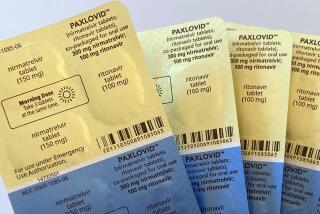Lives, Research Hinge on Limiting New AIDS Drug : Free Access Only for the Desperately Ill
A landmark medical experiment is about to begin: A new, unproven drug will be provided to thousands of people who desperately need it while research is conducted on its safety and effectiveness.
This “parallel track” of research and simultaneous free drug distribution of the drug is the result of immense pressure from AIDS activists to make experimental drugs available as early as possible. The program will, however, still have an important limit, one that must be accepted for the “parallel track” experiment to work: The drug will be made available only to those who definitely need it, and not to all those who might want it.
The experimental drug, DDI, will be made available to people who are unable to benefit from the only approved AIDS anti-virus drug, AZT. The first people to receive DDI will be those with AIDS or AIDS-related symptoms who get too sick from AZT to tolerate it. Around the same time, it is expected that the new drug will also be given to people who are taking AZT but are still getting sick, as shown by opportunistic infections, progressive weight loss, severe fatigue and so on.
There will be thousands of others who are likely to want DDI--people who have decided that AZT is too toxic to take without trying it, and those who are doing well on AZT but mistakenly believe that DDI has been proven to be a superior drug. These people will not be able to get DDI, at least until more research is completed.
This decision to limit an experimental drug to those who need it is a wise and important one. DDI has been tested on fewer than 100 people. These studies suggest that over a short term, DDI is less toxic than AZT. However, we do not have adequate information about long-term side effects.
More important, there is no solid information about whether DDI is as effective as, or more or less effective than, AZT. Indeed, limited information from the manufacturer suggests it may be somewhat less effective.
But the fundamental question is: Why shouldn’t people who want the drug be allowed to have it? Shouldn’t people with a life-threatening illness be given any hope they want?
There is no doubt that people who are sick and cannot tolerate AZT, or are getting sick in spite of AZT, need DDI as their only current hope. But for the others, a proven alternative is available. AZT does prolong life and keep many people productive, and at the lower doses now advised, its toxicity appears much less than before.
Still, the question persists: Why shouldn’t people be allowed to choose? The answer is both practical and philosophical.
Realistically, if an experimental drug were available to anyone who wanted it, there would be little incentive for people to enter research studies, and without studies proving a drug safe and effective, it could not be approved by the Food and Drug Administration and then marketed. Instead, the drug company would have to provide the drug free to thousands of people. (An FDA physician estimates that it costs up to $5,000 per patient per year to provide a drug for free--and that is just the administrative cost; it does not include the cost of the drug itself.) Obviously, if a drug can not be marketed, there will be no incentive for the company to continue its free distribution.
Indeed, if that were to happen to DDI, the prototype of the parallel-track experiment, and the drug were not marketed, it is highly probable that other drug companies would be discouraged from undertaking research on drugs for AIDS and other life-threatening diseases. That decision would be a disaster for millions of Americans.
Finally, how can people decide that DDI is a better choice for them than AZT? At this point, the answer is they cannot decide--we simply do not know. That is why research is so critical. That is how we learned that AZT works, and that aerosolized pentamidine prevents the most common pneumonia seen in AIDS. It is also how we learned about two previously highly touted drugs--suramin was too toxic and dextran sulfate was not absorbed, so it was of no benefit. But if all these and other “promising” drugs were made widely available, no one would have adequate information to make an intelligent choice about what drug or drugs to take.
Society often assumes a responsibility for protecting people from potentially dangerous situations. Thus we tolerate seat-belt laws, speed limits and the requirement that drugs be proven safe and effective before they are made widely available. That is acceptable and wise.
To completely do away with regulations that protect people from unproven drugs would lead to chaos and many unnecessary deaths. Even if the right to choose were granted, people would not have sufficient information to make an intelligent choice among untested drugs. So research and appropriate regulations must be protected.
For people with no option--people for whom AZT cannot do what it has done and is doing for others--DDI must be made immediately available. For the others, AZT should be taken until we know more about DDI. And AIDS activists should be proud of the changes they have wrought.






